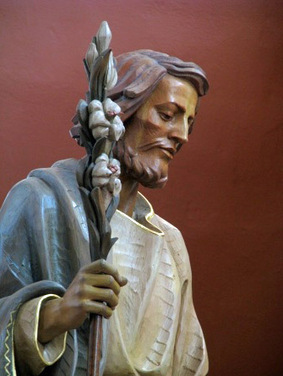
Despite his position as the human father figure in the family of Jesus, Joseph is perhaps one of the least known heroes of faith. In mainstream Christianity he is represented in countless Christmas scenes and crèches each year, but then largely disappears from view. Even from the perspective of the gospel writers (who doubtless desired to stress the true nature of Christ’s parentage), Joseph appears as a somewhat indistinct third member of the family mentioned in only a few scant verses before and after the nativity. Yet a number of important facts can be deduced regarding Joseph’s character of faith.
Although apparently a humble and practical man (the Greek word tekton which is applied to him can mean a worker in a number of trades other than just “carpentry”), Joseph was a descendant of King David (Matthew 1:20) and clearly a man of great integrity. When we are first introduced to him we are told “… Mary was pledged to be married to Joseph, but before they came together, she was found to be pregnant through the Holy Spirit. Because Joseph her husband was faithful to the law, and yet did not want to expose her to public disgrace, he had in mind to divorce her quietly” (Matthew 1:18-19). We see that although Joseph was a God-fearing man who was faithful to the observance of the Mosaic law (which in this instance would have punished Mary), he was also a man who was willing to follow first and foremost the law of love. Rather than reacting to Mary’s pregnancy with indignation – especially to protect his own reputation – Joseph’s desire to divorce Mary “quietly” is a clear indication of the degree of his compassion and decency.
When Joseph’s kindness was rewarded by a dream in which an angel explained the divine origin of Mary’s pregnancy, he accepted the role he had been given without hesitation (Matthew 1:24). We then hear nothing of him until the events surrounding the nativity of Jesus. Some time after Jesus’ birth, Joseph was again instructed by an angel in a dream – this time to flee with Mary and the infant Jesus. “So he got up, took the child and his mother during the night and left for Egypt, where he stayed until the death of Herod … After Herod died, an angel of the Lord appeared in a dream to Joseph in Egypt and said, ‘Get up, take the child and his mother and go to the land of Israel, for those who were trying to take the child’s life are dead.’ So he got up, took the child and his mother and went to the land of Israel” (Matthew 2:13-15, 18-21).
Joseph clearly experienced more than the average new parents’ share of lost sleep due to the multiple dreams in which he was told to get up and do something – yet in every case we see him reacting obediently and at once. In each situation we see things being commanded of Joseph which were of potential danger or loss to him and his family, especially considering the difficulties of travel in that day, yet he responded quickly with faith in every instance.
We see Joseph only one further time in the Gospels, leading his family to the Passover festival in Jerusalem when Jesus was twelve. After that he disappears from the narratives, so it is usually presumed that he died at some time before Jesus began his ministry. Mary continues to be mentioned, of course, and it is due to these extra references, and those in earlier narratives, that we feel we know her better than Joseph. Yet Joseph must have had many excellent qualities to have been selected with ultimate care and knowledge, along with Mary, as the human parents of God’s Son. We can presume that Joseph was an excellent human father figure and male role model for the growing Jesus, and despite the lack of many details we certainly see him as a man not only of warmly accepting love, but also as a man of deep faith who could be trusted to act firmly and without delay when his faith required it.
 RSS Feed
RSS Feed
